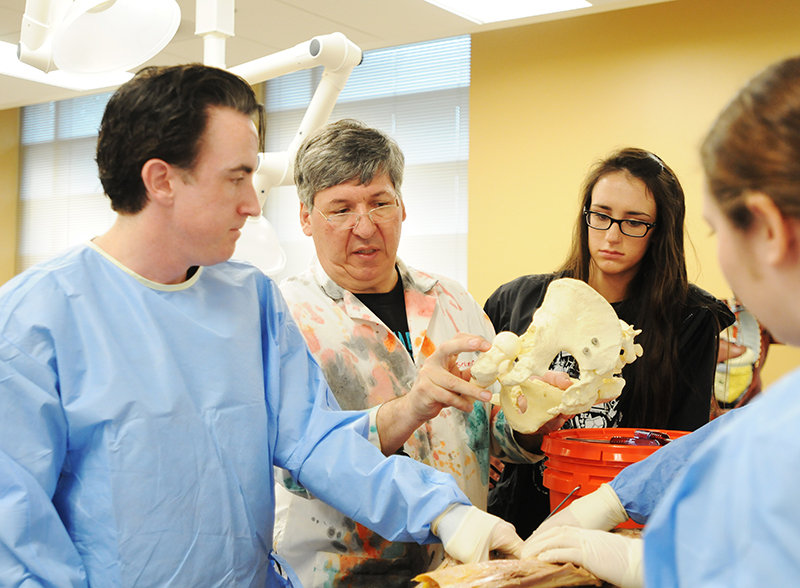News
‘An Appreciation of the Human Body’: Dalton State Biology Students Work with Human Cadaver
04/09/15
 When “DAPHNE” first arrived at Dalton State, no one knew much about her – basically that she was around 92 when she died.
When “DAPHNE” first arrived at Dalton State, no one knew much about her – basically that she was around 92 when she died.
After spending some time with her, students in one of Dr. Gene Mesco’s biology classes feel they are beginning to know her well - as they have literally held her heart, brain, and other organs in their hands.
DAPHNE, as she is affectionately called, stands for Dalton Anatomy and Physiology Human Experience.
She is a human cadaver, the first at Dalton State, and one of only a few available to undergraduate students in the country. Inclusion of a cadaver lab is just one more way in which Dalton State’s new Peeples Hall provides an enriched undergraduate experience for science students. For biology majors hoping to advance to medical or graduate school, the experience with Daphne can give them an advantage over their peers.
“I hope students gain an appreciation of the complexity and simplicity of the human body,” Mesco said. “With an actual human cadaver, they have the ability to see how the body works. It’s a marvelous machine.”
Breann Campbell, a senior biology major, knows this is a good experience for her to have when entering graduate school to study occupational therapy.
“I love getting this pre-experience at a small school first,” she said. “I’m relearning anatomy in a different way. The body doesn’t look the same as what you see in the books. With the cadaver, I’m seeing how our bodies actually work together.”
DAPHNE showed signs of immobility primarily through muscular atrophy in the last years of her life.
“Seeing that makes me know my job will be important one day,” Campbell said. “It’s worth it to me to continue toward this career. I want to use the skills I’ve been given to help others. I’m very passionate about that.”
Brooke Bingham, a student who assists Mesco during the lab, wants to become a physician’s assistant in orthopedics. He already has experience helping surgeons as a medical assistant.
“I’m taking what I’ve learned in the operating room and using it here,” he said. “I’ve seen this stuff, but I’ve never put my hands on it. Now I’ve held a human heart. It’s awesome.”
It was Bingham who noticed something different about the cadaver’s hip. Her leg was rotated outward slightly, and Bingham’s hypothesis was that it had been broken at some point. As the class worked toward the hip, they found it was artificial.
Mesco took that opportunity to teach the class how the artificial hip compares to a natural one.
While admitting running the cadaver lab is a lot of extra work, he knows it’s worth it for the students.
The College arranged for the cadaver through a company that places bodies that have been donated to science. The body is donated, left at institutions for a year for dissection and study, then collected, cremated, and returned to the family.
As part of the lab, students are taught proper respect for the body that has been donated for their use. The College partnered with professionals from Julian Peeples Funeral Home that shared proper care and ethical practices with the students.
“We keep it personal,” Mesco said. “We appreciate this experience and her forethought to donate her body. We appreciate we’re emotional beings. We talk about how to behave and interact and how to treat the body with proper respect. I’ve only been at Dalton State for three years, but I’ve been really impressed with the students and the quality of work done here.”
The class, a special topics course in human anatomy, has been so popular Mesco has had to turn students away. There is an application process to be accepted to the cadaver lab. No more than 10 students are allowed to take the class each semester.
“I’m thrilled we can provide this opportunity at Dalton State,” said Dr. Randall Griffus, dean of the School of Science, Technology, and Mathematics. “Not many undergraduates have the opportunity to dissect a cadaver. It will make their applications stand out when they apply to medical school.”
